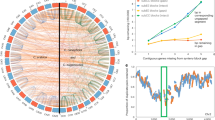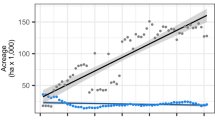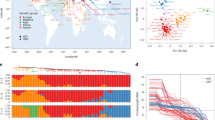Abstract
BREEDING improved varieties of apomictic species is complicated by the problem of hybridizing plants and thereby recombining desirable characteristics, and by the possibility that many otherwise desirable hybrids will reproduce sexually.
This is a preview of subscription content, access via your institution
Access options
Subscribe to this journal
Receive 51 print issues and online access
$199.00 per year
only $3.90 per issue
Buy this article
- Purchase on Springer Link
- Instant access to full article PDF
Prices may be subject to local taxes which are calculated during checkout
Similar content being viewed by others
References
Tinney, F. W., J. Agric. Res., 60, 351 (1940).
Brittingham, W. H., J. Agric. Res., 67, 225 (1943).
Åkerberg, E., Hereditas, 25, 359 (1939); 28, 1 (1942).
Konzak, C. F., Brookhaven Symposia in Biology, 9, 157 (1956).
Author information
Authors and Affiliations
Rights and permissions
About this article
Cite this article
HANSON, A., JUSKA, F. A ‘Progressive’ Mutation induced in Poa pratensis L. by Ionizing Radiation. Nature 184, 1000–1001 (1959). https://doi.org/10.1038/1841000a0
Issue Date:
DOI: https://doi.org/10.1038/1841000a0
This article is cited by
-
In vitro chemical mutagenesis improves the turf quality of bahiagrass
Plant Cell, Tissue and Organ Culture (PCTOC) (2015)
Comments
By submitting a comment you agree to abide by our Terms and Community Guidelines. If you find something abusive or that does not comply with our terms or guidelines please flag it as inappropriate.



